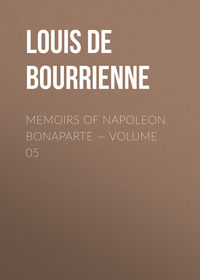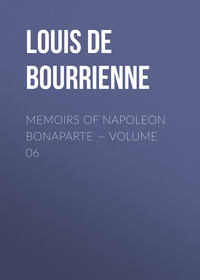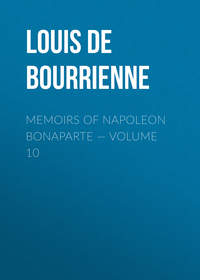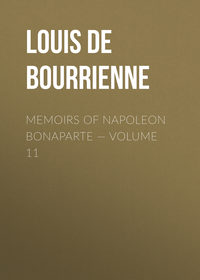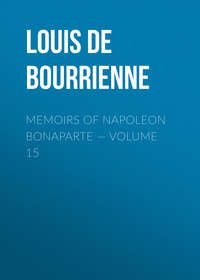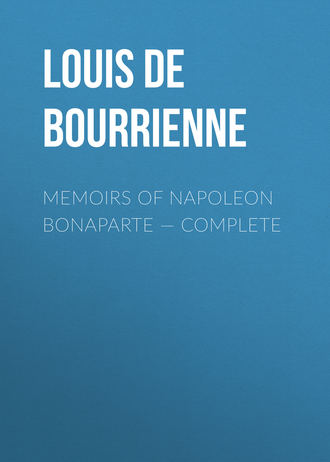 полная версия
полная версияMemoirs of Napoleon Bonaparte — Complete
On our arrival at Ajaccio we learnt the death of Joubert, and the loss of the battle of Novi, which was fought on the 15th of August. Bonaparte was tormented by anxiety; he was in a state of utter uncertainty as to the future. From the time we left Alexandria till our arrival in Corsica he had frequently talked of what he should do during the quarantine, which he supposed he would be required to observe on reaching Toulon, the port at which he had determined to land.
Even then he cherished some illusions respecting the state of affairs; and he often said to me, "But for that confounded quarantine, I would hasten ashore, and place myself at the head of the army of Italy. All is not over; and I am sure that there is not a general who would refuse me the command. The news of a victory gained by me would reach Paris as soon as the battle of Aboukir; that, indeed, would be excellent."
In Corsica his language was very different. When he was informed of our reverses, and saw the full extent of the evil, he was for a moment overwhelmed. His grand projects then gave way to the consideration of matters of minor import, and he thought about his detention in the Lazaretto of Toulon. He spoke of the Directory, of intrigues, and of what would be said of him. He accounted his enemies those who envied him, and those who could not be reconciled to his glory and the influence of his name. Amidst all these anxieties Bonaparte was outwardly calm, though he was moody and reflective.
Providing against every chance of danger, he had purchased at Ajaccio a large launch which was intended to be towed by the 'Muiron', and it was manned by twelve of the best sailors the island could furnish. His resolution was, in case of inevitable danger, to jump into this boat and get ashore. This precaution had well-nigh proved useful.
—[Sir Walter Scott, at the commencement of his Life of Napoleon, says that Bonaparte did not see his native City after 1793. Probably to avoid contradicting himself, the Scottish historian observes that Bonaparte was near Ajaccio on his return from Egypt. He spent eight days there.—Bourrienne.]—
After leaving the Gulf of Ajaccio the voyage was prosperous and undisturbed for one day; but on the second day, just at sunset, an English squadron of fourteen sail hove in sight. The English, having advantage of the lights which we had in our faces, saw us better than we could see them. They recognised our two frigates as Venetian built; but luckily for us, night came on, for we were not far apart. We saw the signals of the English for a long time, and heard the report of the guns more and more to our left, and we thought it was the intention of the cruisers to intercept us on the south-east. Under these circumstances Bonaparte had reason to thank fortune; for it is very evident that had the English suspected our two frigates of coming from the East and going to France, they would have shut us out from land by running between us and it, which to them was very easy. Probably they took us for a convoy of provisions going from Toulon to Genoa; and it was to this error and the darkness that we were indebted for escaping with no worse consequence than a fright.
—[Here Bourrienne says in a note "Where did Sir Walter Scott learn that we were neither seen nor recognised? We were not recognised, but certainly seen," This is corroborated by the testimony of the Duc de Rovigo, who, in his Memoirs, says, "I have met officers of the English navy who assured me that the two frigates had been seen but were considered by the Admiral to belong to his squadron, as they steered their course towards him; and as he knew we had only one frigate in the Mediterranean, and one in Toulon harbour, he was far from supposing that the frigates which he had descried could have General Bonaparte on board." (Savary, tome i. p. 226).]—
During the remainder of the night the utmost agitation prevailed on board the Muiron. Gantheaume especially was in a state of anxiety which it is impossible to describe, and which it was painful to witness: he was quite beside himself, for a disaster appeared inevitable. He proposed to return to Corsica. "No, no!" replied Bonaparte imperiously. "No! Spread all sail! Every man at his post! To the north-west! To the north-west!" This order saved us; and I am enabled to affirm that in the midst of almost general alarm Bonaparte was solely occupied in giving orders. The rapidity of his judgment seemed to grow in the face of danger. The remembrance of that night will never be effaced from my mind. The hours lingered on; and none of us could guess upon what new dangers the morrow's sun would shine.
However, Bonaparte's resolution was taken: his orders were given, his arrangements made. During the evening he had resolved upon throwing himself into the long boat; he had already fixed on the persons who were to share his fate, and had already named to me the papers which he thought it most important to save. Happily our terrors were vain and our arrangements useless. By the first rays of the sun we discovered the English fleet sailing to the north-east, and we stood for the wished-for coast of France.
The 8th of October, at eight in the morning, we entered the roads of Fréjus. The sailors not having recognised the coast during the night, we did not know where we were. There was, at first, some hesitation whether we should advance. We were by no means expected, and did not know how to answer the signals, which has been changed during our absence. Some guns were even fired upon us by the batteries on the coast; but our bold entry into the roads, the crowd upon the decks of the two frigates, and our signs of joy, speedily banished all doubt of our being friends. We were in the port, and approaching the landing-place, when the rumour spread that Bonaparte was on board one of the frigates. In an instant the sea was covered with boats. In vain we begged them to keep at a distance; we were carried ashore, and when we told the crowd, both of men and women who were pressing about us, the risk they ran, they all exclaimed, "We prefer the plague to the Austrians!"
What were our feelings when we again set foot on the soil of France I will not attempt to describe. Our escape from the dangers that threatened us seemed almost miraculous. We had lost twenty days at the beginning of our voyage, and at its close had been almost taken by an English squadron. Under these circumstances, how rapturously we inhaled the balmy air of Provence! Such was our joy, that we were scarcely sensible of the disheartening news which arrived from all quarters. At the first moment of our arrival, by a spontaneous impulse, we all repeated, with tears in our eyes, the beautiful lines which Voltaire has put into the mouth of the exile of Sicily.
Bonaparte has been reproached with having violated the sanitary laws; but, after what I have already stated respecting his intentions, I presume there can remain no doubt of the falsehood of this accusation. All the blame must rest with the inhabitants of Fréjus, who on this occasion found the law of necessity more imperious than the sanitary laws. Yet when it is considered that four or five hundred persons, and a quantity of effects, were landed from Alexandria, where the plague had been raging during the summer, it is almost a miracle that France, and indeed Europe escaped the scourge.
CHAPTER XXII
1799.
Effect produced by Bonaparte's return—His justification— Melancholy letter to my wife—Bonaparte's intended dinner at Sens— Louis Bonaparte and Josephine—He changes his intended route— Melancholy situation of the provinces—Necessity of a change— Bonaparte's ambitious views—Influence of popular applause— Arrival in Paris—His reception of Josephine—Their reconciliation— Bonaparte's visit to the Directory—His contemptuous treatment of Sieyès.
The effect produced in France and throughout Europe by the mere intelligence of Bonaparte's return is well known. I shall not yet speak of the vast train of consequences which that event entailed. I must, however, notice some accusations which were brought against him from the time of our landing to the 9th of November. He was reproached for having left Egypt, and it was alleged that his departure was the result of long premeditation. But I, who was constantly with him, am enabled positively to affirm that his return to France was merely the effect of a sudden resolution. Of this the following fact is in itself sufficient evidence.
While we were at Cairo, a few days before we heard of the landing of the Anglo-Turkish fleet, and at the moment when we were on the point of setting off to encamp at the Pyramids, Bonaparte despatched a courier to France. I took advantage of this opportunity to write to my wife. I almost bade her an eternal adieu. My letter breathed expressions of grief such as I had not before evinced. I said, among other things, that we knew not when or how it would be possible for us to return to France. If Bonaparte had then entertained any thought of a speedy return I must have known it, and in that case I should not certainly have distressed my family by a desponding letter, when I had not had an opportunity of writing for seven months before.
Two days after the receipt of my letter my wife was awoke very early in the morning to be informed of our arrival in France. The courier who brought this intelligence was the bearer of a second letter from me, which I had written on board ship, and dated from Fréjus. In this letter I mentioned that Bonaparte would pass through Sens and dine with my mother.
In fulfilment of my directions Madame de Bourrienne set off for Paris at five in the morning. Having passed the first post-house she met a Berlin containing four travellers, among whom she recognised Louis Bonaparte going to meet the General on the Lyons road. On seeing Madame de Bourrienne Louis desired the postillion to stop, and asked her whether she had heard from me. She informed him that we should pass through Sens, where the General wished to dine with my mother, who had made every preparation for receiving him. Louis then continued his journey. About nine o'clock my wife met another Berlin, in which were Madame Bonaparte and her daughter. As they were asleep, and both carriages were driving at a very rapid rate, Madame de Bourrienne did not stop them. Josephine followed the route taken by Louis. Both missed the General, who changed his mind at Lyons, and proceeded by way of Bourbonnais. He arrived fifteen hours after my wife; and those who had taken the Burgundy road proceeded to Lyons uselessly.
Determined to repair in all haste to Paris, Bonaparte had left Fréjus on the afternoon of the day of our landing. He himself had despatched the courier to Sens to inform my mother of his intended visit to her; and it was not until he got to Lyons that he determined to take the Bourbonnais road. His reason for doing so will presently be seen. All along the road, at Aix, at Lyons, in every town and village, he was received, as at Fréjus, with the most rapturous demonstrations of joy.
—[From Fréjus to Aix a crowd of men kindly escorted us, carrying torches alongside the carriage of the General, not so much to show their enthusiasm as to ensure our safety (Bourrienne) These brigands became so bad in France that at one time soldiers were placed in the imperials of all the diligences, receiving from the wits the curiously anticipative name of "imperial armies".]—
Only those who witnessed his triumphal journey can form any notion of it; and it required no great discernment to foresee something like the 18th Brumaire.
The provinces, a prey to anarchy and civil war, were continually threatened with foreign invasion. Almost all the south presented the melancholy spectacle of one vast arena of conflicting factions. The nation groaned beneath the yoke of tyrannical laws; despotism was systematically established; the law of hostages struck a blow at personal liberty, and forced loans menaced every man's property. The generality of the citizens had declared themselves against a pentarchy devoid of power, justice, and morality, and which had become the sport of faction and intrigue. Disorder was general; but in the provinces abuses were felt more sensibly than elsewhere. In great cities it was found more easy to elude the hand of despotism and oppression.
A change so earnestly wished for could not fail to be realised, and to be received with transport. The majority of the French people longed to be relieved from the situation in which they then stood. There were two dangers bar to cope with—anarchy and the Bourbons. Every one felt the urgent and indispensable necessity of concentrating the power of the Government in a single hand; at the same time maintaining the institutions which the spirit of the age demanded, and which France, after having so dearly purchased, was now about to lose. The country looked for a man who was capable of restoring her to tranquillity; but as yet no such man had appeared. A soldier of fortune presented himself, covered with glory; he had planted the standard of France on the Capitol and on the Pyramids. The whole world acknowledged his superior talent; his character, his courage, and his victories had raised him to the very highest rank. His great works, his gallant actions, his speeches, and his proclamations ever since he had risen to eminence left no doubt of his wish to secure happiness and freedom to France, his adopted country. At that critical moment the necessity of a temporary dictatorship, which sometimes secures the safety of a state, banished all reflections on the consequences of such a power, and nobody seemed to think glory incompatible with personal liberty. All eyes were therefore directed on the General, whose past conduct guaranteed his capability of defending the Republic abroad, and liberty at home,—on the General whom his flatterers, and indeed some of his sincere friends, styled, "the hero of liberal ideas," the title to which he aspired.
Under every point of view, therefore, he was naturally chosen as the chief of a generous nation, confiding to him her destiny, in preference to a troop of mean and fanatical hypocrites, who, under the names of republicanism and liberty, had reduced France to the most abject slavery.
Among the schemes which Bonaparte was incessantly revolving in his mind may undoubtedly be ranked the project of attaining the head of the French Government; but it would be a mistake to suppose that on his return from Egypt he had formed any fixed plan. There was something vague in his ambitious aspirations; and he was, if I may so express myself, fond of building those imaginary edifices called castles in the air. The current of events was in accordance with his wishes; and it may truly be said that the whole French nation smoothed for Bonaparte the road which led to power. Certainly the unanimous plaudits and universal joy which accompanied him along a journey of more than 200 leagues must have induced him to regard as a national mission that step which was at first prompted merely by his wish of meddling with the affairs of the Republic.
This spontaneous burst of popular feeling, unordered and unpaid for, loudly proclaimed the grievances of the people, and their hope that the man of victory would become their deliverer. The general enthusiasm excited by the return of the conqueror of Egypt delighted him to a degree which I cannot express, and was, as he has often assured me, a powerful stimulus in urging him to the object to which the wishes of France seemed to direct him.
Among people of all classes and opinions an 18th Brumaire was desired and expected. Many royalists even believed that a change would prove favourable to the King. So ready are we to persuade ourselves of the reality of what we wish.
As soon as it was suspected that Bonaparte would accept the power offered him, an outcry was raised about a conspiracy against the Republic, and measures were sought for preserving it. But necessity, and indeed, it must be confessed, the general feeling of the people, consigned the execution of those measures to him who was to subvert the Republic. On his return to Paris Bonaparte spoke and acted like a man who felt his own power; he cared neither for flattery, dinners, nor balls,—his mind took a higher flight.
We arrived in Paris on the 24th Vendemiaire (the 16th of October). As yet he knew nothing of what was going on; for he had seen neither his wife nor his brothers, who were looking for him on the Burgundy road. The news of our landing at Fréjus had reached Paris by a telegraphic despatch. Madame Bonaparte, who was dining with M. Gohier when that despatch was communicated to him, as president of the Directory, immediately set off to meet her husband, well knowing how important it was that her first interview with him should not be anticipated by his brothers.
The imprudent communications of Junot at the fountains of Messoudiah will be remembered, but, after the first ebullition of jealous rage, all traces of that feeling had apparently disappeared. Bonaparte however, was still harassed by secret suspicion, and the painful impressions produced by Junot were either not entirely effaced or were revived after our arrival in Paris. We reached the capital before Josephine returned. The recollection of the past, the ill-natured reports of his brothers,
—[Joseph Bonaparte remarks on this that Napoleon met Josephine at Paris before his brothers arrived there, (Compare d'Abrantès, vol. 1, pp. 260-262 and Rémusat, tome i. pp. 147-148.)]—
and the exaggeration of facts had irritated Napoleon to the very highest pitch, and he received Josephine with studied coldness, and with an air of the most cruel indifference. He had no communication with her for three days, during which time he frequently spoke to me of suspicions which his imagination converted into certainty; and threats of divorce escaped his lips with no less vehemence than when we were on the confines of Syria. I took upon me the office of conciliator, which I had before discharged with success. I represented to him the dangers to be apprehended from the publicity and scandal of such an affair; and that the moment when his grand views might possibly be realized was not the fit time to entertain France and Europe with the details of a charge of adultery. I spoke to him of Hortense and Eugène, to whom he was much attached. Reflection, seconded by his ardent affection for Josephine, brought about a complete reconciliation. After these three days of conjugal misunderstanding their happiness was never afterwards disturbed by a similar cause.
—[In speaking of the unexpected arrival of Bonaparte and of the meeting between him and Josephine, Madame Junot says: "On the 10th October Josephine set off to meet her husband, but without knowing exactly what road he would take. She thought it likely he would come by way of Burgundy, and therefore Louis and she set off for Lyons.
"Madame Bonaparte was a prey to great and well-founded aspersions. Whether she was guilty or only imprudent, she was strongly accused by the Bonaparte family, who were desirous that Napoleon should obtain a divorce. The elder M. de Caulaincourt stated to us his apprehensions on this point; but whenever the subject was introduced my mother changed the conversation, because, knowing as she did the sentiments of the Bonaparte family, she could not reply without either committing them or having recourse to falsehood. She knew, moreover, the truth of many circumstances which M. de Caulaincourt seemed to doubt, and which her situation with respect to Bonaparte prevented her from communicating to him.
"Madame Bonaparte committed a great fault in neglecting at this juncture to conciliate her mother-in-law, who might have protected her against those who sought her ruin and effected it nine years later; for the divorce in 1809 was brought about by the joint efforts of all the members of the Bonaparte family, aided by some of Napoleon's most confidential servants, whom Josephine, either as Madame Bonaparte or as Empress, had done nothing to make her friends.
"Bonaparte, on his arrival in Paris, found his house deserted: but his mother, sisters, and sisters-in-law, and, in short, every member of his family, except Louis, who had attended Madame Bonaparte to Lyons, came to him immediately. The impression made upon him by the solitude of his home and its desertion by its mistress was profound and terrible, and nine years afterwards, when the ties between him and Josephine were severed for ever, he showed that it was not effaced. From not finding her with his family he inferred that she felt herself unworthy of their presence, and feared to meet the man she had wronged. He considered her journey to Lyons as a mere pretence.
"M. de Bourrienne says that for some days after Josephine's return Bonaparte treated her with extreme coldness. As he was an eyewitness, why does he not state the whole truth, and say that on her return Bonaparte refused to see her and did not see her? It was to the earnest entreaties of her children that she owed the recovery, not of her husband's love, for that had long ceased, but of that tenderness acquired by habit, and that intimate intercourse which made her still retain the rank of consort to the greatest man of his age. Bonaparte was at this period much attached to Eugène Beauharnais, who, to do him justice, was a charming youth. He knew less of Hortense; but her youth and sweetness of temper, and the protection of which, as his adopted daughter, she besought him not to deprive her, proved powerful advocates, and overcame his resistance.
"In this delicate negotiation it was good policy not to bring any other person into play, whatever might be their influence with Bonaparte, and Madame Bonaparte did not, therefore, have recourse either to Barras, Bourrienne, or Berthier. It was expedient that they who interceded for her should be able to say something without the possibility of a reply. Now Bonaparte could not with any degree of propriety explain to such children as Eugène or Hortense the particulars of their mother's conduct. He was therefore constrained to silence, and had no argument to combat the tears of two innocent creatures at his feet exclaiming, 'Do not abandon our mother; she will break her heart! and ought injustice to take from us, poor orphans, whose natural protector the scaffold has already deprived us of, the support of one whom Providence has sent to replace him!' "The scene, as Bonaparte has since stated, was long and painful, and the two children at length introduced their mother, and placed her in his arms. The unhappy woman had awaited his decision at the door of a small back staircase, extended at almost full length upon the stairs, suffering the acutest pangs of mental torture.
"Whatever might be his wife's errors, Bonaparte appeared entirely to forget them, and the reconciliation was complete. Of all the members of the family Madame Leclerc was most vexed at the pardon which Napoleon had granted to his wife. Bonaparte's mother was also very ill pleased; but she said nothing. Madame Joseph Bonaparte, who was always very amiable, took no part in these family quarrels; therefore she could easily determine what part to take when fortune smiled on Josephine. As to Madame Bacciocchi, she gave free vent to her ill-humour and disdain; the consequence was that her sister-in-law could never endure her. Christine who was a beautiful creature, followed the example of Madame Joseph, and Caroline was so young that her opinion could have no weight in such an affair. As to Bonaparte's brothers, they were at open war with Josephine."]—
On the day after his arrival Bonaparte visited the Directors.
—[The Directors at this time were Barras, Sieyès, Moulins, Gohier, and Roger Ducos.]—
The interview was cold. On the 24th of October he said to me, "I dined yesterday at Gohier's; Sieyès was present, and I pretended not to see him. I observed how much he was enraged at this mark of disrespect."—"But are you sure he is against you?" inquired I. "I know nothing yet; but he is a scheming man, and I don't like him." Even at that time Bonaparte had thoughts of getting himself elected a member of the Directory in the room of Sieyès.



